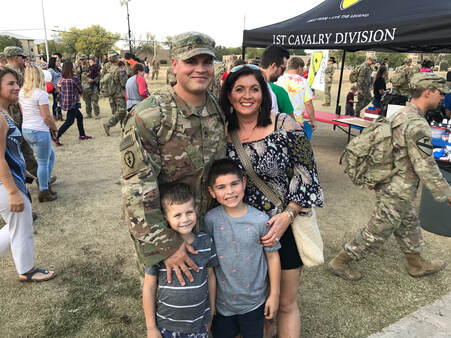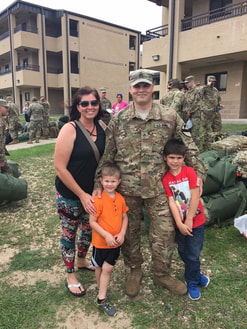|
Lisa and Jeff’s story began 11 years ago, when they got married. Jeff is an E7, Sergeant first class in the United States Army. He has proudly served our country for 18 years. That in itself is just amazing. But this isn’t all their family has to brag about. They have overcome many things that families today don’t ever have to think about. In 2011, Lisa gave birth to their first child. A baby boy. To most this is one of the happiest times of their lives, but things were a little different for the Story's. When Jaxon was born, Jeff was deployed in the middle east. Although Lisa was lucky to have family there during her delivery, it still didn’t feel “right”. She didn’t want to go through this experience without Jeff, but as a military spouse, unfortunately, being alone happens more often than we would like. Her first night alone with her new baby was one of the hardest nights of her life. In the middle of the night, she lived a real life nightmare. Doctors rushed her baby away, after having complications from his circumscision. Luckily, the hospital she delivered at had a great HTC and Jaxon got a proper diagnosis immediately. He was diagnosed with severe hemophilia type A, and given a factor infusion to resolve the bleeding issues. This is when things got rough; things got real. Military families try to always be prepared for “worst case scenarios.” Although they had no family history of Hemophilia, they had a protocol in place as a safety net for what could possibly happen. In the military, you are able to send Red Cross messages to family members who are deployed. The message reaches their superiors so they can be contacted and sent home if need be. Lisa and Jeff had all this worked out, knowing she would be giving birth while he was gone. She immediately tried sending a message to her husband's command with no luck. “In the middle of the night Jaxon was diagnosed and I was all alone receiving the news. I felt that I had nobody to turn to at that point, nobody to lean on, and I couldn’t find a way to contact Jeff to inform him.” The number was wrong and she had no one around to help her get in contact with him, to tell him what was going on with their baby.
Lisa is very thankful for the social workers at the HTC. They stepped in, and took over the task of getting in contact with Jeff as soon as they could. They also got Lisa involved with their local chapter and she was able to meet other moms and learn about what life was going to look like with Hemophilia. At first, Lisa remembers feeling like this was a death sentence for Jaxon. That his life would be full of setbacks and let downs. He would never live “normally” because of Hemophilia. “The more we learned about the diagnosis and treatment plans the more we understood that he would be able to live a full healthy life with proper treatment and care. After getting past that initial scare, it was more of the lack of a “village” there to support us that really played a big role in our life!” They welcomed their second son two years after Jaxon was born. Even though it was a worry throughout the pregnancy, they knew that if Xavier was born with Hemophilia, they were prepared and would jump in with both feet to make sure he received the care he would need, along side his big brother. Between the time Jaxon was born, and they got pregnant with Xavier, Lisa had genetic testing done and discovered that she is, in fact a carrier of the Hemophilia gene. But Xavier was born without the gene, and doesn’t have Hemophilia. The Storys have relocated a few times since having their boys. They are currently stationed in Texas. Lisa said that one of the hardest parts in living this lifestyle is the constant change in location. Not only do they have to uproot their family every few years, they have to go through the difficult struggle of getting Jaxon re-established due to his diagnosis. She says, “I always plan to not work for at least 6 months after a permanent change of station (PCS). There is too much work to be done." She continues, “We have orientation and intense training for anybody that will be alone with our children including educators at the schools and even babysitters, so we can feel comfortable leaving them in their hands!” Lisa helped to start a “Military Bleeders” facebook group. Which initially had a good amount of members, but has since gone silent as no one really kept up with it. Military families are often forced to receive care at their local military treatment facilities (MTF), who lack the training and knowledge that is readily available at HTCs. After discussing the “Bleeding Disorders Brigade” with Lisa, she agrees that there is a huge need for this in our communities. She loves the idea of being able to have a point of contact, that is in place to assist other families during their relocations. In her words, “having families that we are in contact with that are military and are on the same journey as us, would be incredibly beneficial. From knowing who is in the area that our kids can get along with, play together, support each other, and know that they’re not alone would be huge for young kids. We could talk to each other about the best care in the area, hospitals that have our factor on hand, resources and events to educate ourselves, and so, so, so much more. Having another mother in the area that I could trust to infuse my son if I’m not around, or can pick him up from school and treat him would be a game changer for all of us that are afraid to leave our kids to go to work every day. This is so important because as a military spouse, we cannot depend on our active duty service members, because they are gone so often.“ Lisa loves to help out and encourage moms that are dealing with the hemophilia diagnosis’, and especially has a heart to help fellow military spouses. “Definitely educate yourself on every aspect of this disorder, don’t be afraid to reach out and ask questions. Don’t be afraid to advocate for your family and your child. You know your child the best, and what’s best for them.” |
Hope Charities
|
Live Chat Support
×
Connecting

You:
::content::
::agent_name::
::content::
::content::
::content::



 RSS Feed
RSS Feed